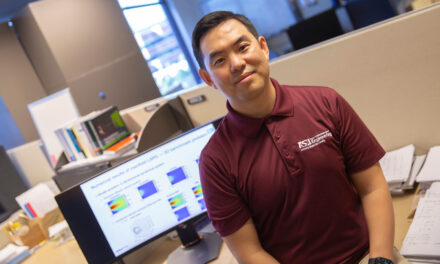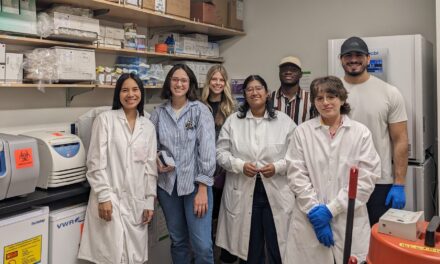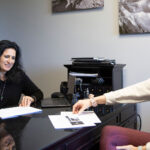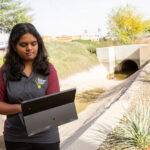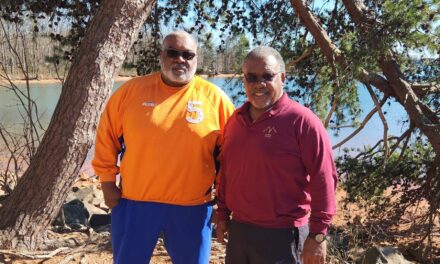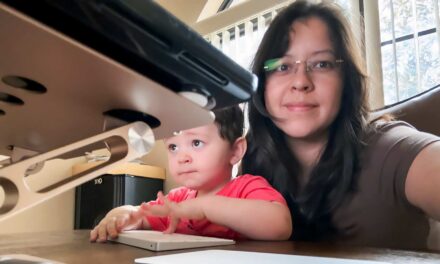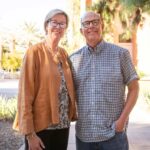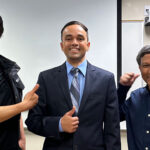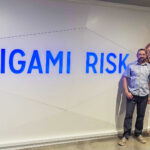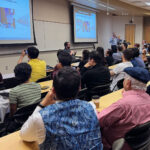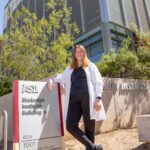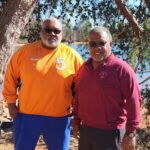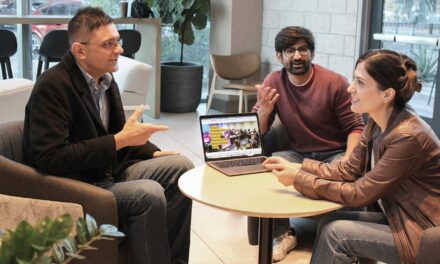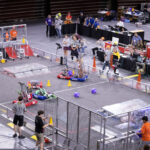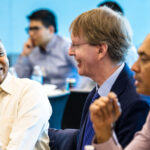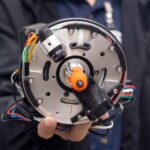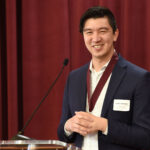
ASU team will vie for synthetic biology championship
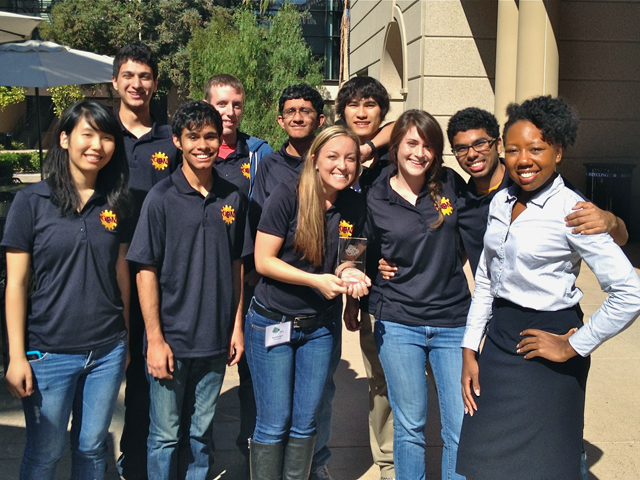
ASU’s2012 iGEM team: (back, left to right) Hyder Hussain, Ethan Ward, Rohit Rajan, Ryan Muller (front, left to right) Ellen Qin, Nisarg Patel, Amanda Ispas, Maddie Sands, Abhinav Markus and faculty advisor Karmella Haynes, an assistant professor in the School of Biological and Health Systems Engineering. Photo by James Alling/ASU
Posted October 27, 2012
A team of Arizona State University undergraduates – including three engineering majors – is headed to the international championship of one of the world’s premiere student engineering and science competitions.
The team won a gold medal and the “Best Human Practices Advance” award recently at a regional event in the 2012 International Genetically Engineered Machines (iGEM) competition at Stanford University.
The nine-member squad is now preparing to go the Massachusetts Institute of Technology (MIT) to vie for the grand prize – the BioBrick Trophy – at the iGEM World Championship Nov. 2 through 5.
The award it won at the regional is given to the team judged to be working the hardest to find new ways to help people address the impacts of ongoing advances in biotechnology.
Of 24 teams that competed in the iGEM Americas West Regional Jamboree at Stanford, only eight move forward to the championship. There the ASU students will face 65 teams from throughout the Americas, Europe, and Asia.
“We are simply overjoyed at how well our team worked together,” says Maddie Sands, an anthropology major in the university’s School of Human Evolution and Social Change. “All of our team members are passionate and talented individuals. We are truly dedicated to creating positive change in the world around us through scientific advances.”
The contest focuses on synthetic biology and challenges students to design and build simple biological systems.
ASU team members are developing portable, low-cost biosensor systems to detect pathogens in water supplies. Pathogens are organisms that can cause serious disease in other organisms, including humans.
The group is particularly focused on detecting pathogens that cause diarrhea since worldwide, diarrheal disease is among the leading causes of death among children under the age of five.
“I think we were able to stand out from the crowd,” says Nisarg Patel, a molecular biosciences and biotechnology major in School of Life Sciences, as well as a political science major in the College of Liberal Arts and Sciences.
“First, we created a project aimed at addressing an immediate global issue.” He says. “Second, we realized that developing a biosensor is just part of the solution in reducing childhood diarrhea – and so we also focused on education. Finally, our group was unique in that everyone played a part in presenting our research, and other teams did not use that strategy.”
Each team was given 20 minutes to present its research, after which a panel of judges asked detailed questions about specific aspect of the projects. Then, teams presented posters and fielded more questions by the judges.
In 2011, ASU’s first iGEM team earned a bronze medal in the regional event – delivering an exceptional performance for a school new to the competition, but it was not enough to move up to the next level.
This year, the team had to overcome several hurdles. Students had to recruit several new team members, secure sponsors, start a working lab from the ground up, find their own workspace and coordinate time dedicated to their research.
The foundation the students built last year, as well as this year’s effort to strengthen the team, paid off.
“We were the underdogs coming into this competition,” says Hyder Hussain, a biomedical engineering major in ASU’s Ira A. Fulton Schools of Engineering. “Even though our project was not as complex as others, and we are still perfecting the design, the judges saw great promise in our project and were quite impressed.”
The team plans to continue research prior to the international competition. Students will be completing production and conducting tests on the biosensors. The group also has plans to improve the “human practice advances” portion of their presentation. Faculty advisor Karmella Haynes, an assistant professor in the School of Biological and Health Systems Engineering, and graduate advisor James Alling will travel with the team to MIT.
Along with Sands, Patel and Hussain, the ASU iGEM team includes: biomedical engineering majors Abhinav Markus, Ethan Ward, Amanda Ispas; chemistry and biochemistry majors Ryan Muller and Ellen Qin; and biochemistry major Rohit Rajan. Other advisors are Vincent Pizziconi, and Xiao Wang, professors in School of Biological and Health Systems Engineering, and Rene Davis from the Biodesign Institute.
ASU iGEM team sponsors include: the School of Life Sciences; Barrett, The Honors College; Ira A. Fulton Schools of Engineering and the School of Biological Health Systems and Engineering; the College of Liberal Arts and Sciences; the School of Politics and Global Studies; and the Chemistry and Biochemistry department.
Media Contacts:
Joe Kullman, joseph.kullman@asu.edu
(480) 965-8122
Ira A. Fulton Schools of Engineering
Sandy Leander, sandra.leander@asu.edu
480-965-9865
School of Life Sciences


